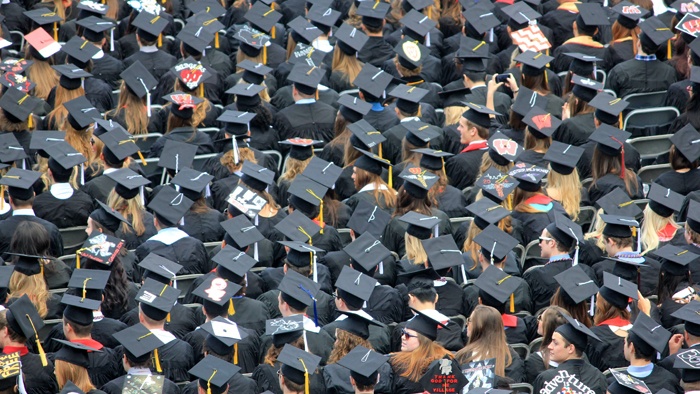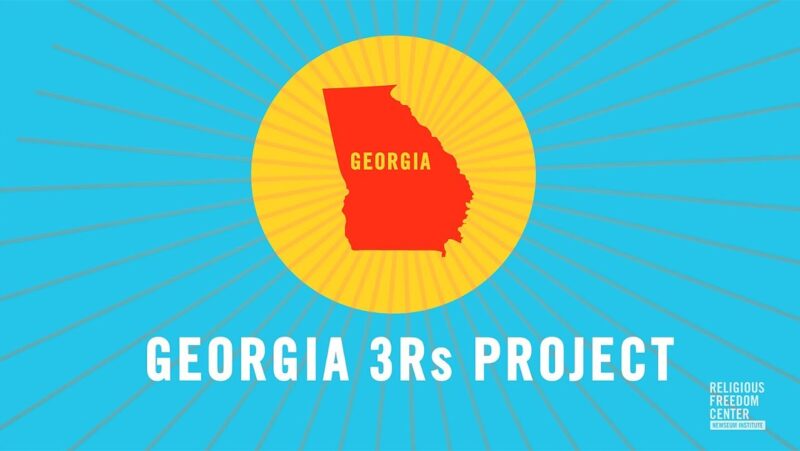First Amendment Facts: Graduation Ceremonies, Prayer and Religious Freedom

Each May, graduation ceremonies are an exciting opportunity to celebrate the hard work of your friends, family and fellow students, and some people may feel moved to honor the occasion with a prayer.
But is this constitutionally allowed? The legal history of prayer at public school graduation ceremonies is complicated and controversial. So, let’s start with the basics.
The free exercise clause of the First Amendment protects students’ rights to voluntarily pray at school-sponsored events, whether it is by themselves or in a group. That means if you, as a student, choose to say a prayer silently or aloud before, during or after the graduation ceremony, the Constitution protects your right to do so, as long as you are not causing a “significant disruption” to the ceremony.
The establishment clause, however, prohibits any form of school-endorsed prayer. This means an individual representing a public school — like a teacher, administrator or outside guest invited by the school — cannot lead prayer at graduation, even if student participation in the prayer is optional.
Infographic: Prayer in School
This precedent comes from Lee v. Weisman (1991), a case in which a Rhode Island family sued their public middle school for inviting clergy to lead prayer at graduation. The school defended the practice, arguing that neither participation in the prayer nor attendance at graduation itself were mandatory for students. But the Supreme Court disagreed, ruling that even though participation was technically optional the practice created “subtle and indirect coercion” to participate in government-led religious activity, thereby violating the establishment clause.
But what about student-led prayer? Can a school-designated student speaker lead a prayer while at the podium? Most likely, no.
In June 2000, the court ruled on Santa Fe Independent School District v. Doe, a case concerning student-led nonsectarian prayer conducted over the loudspeaker at a school-sponsored event. The court decided that even though it was a student leading the prayer, it still counted as government speech because it was a regularly held, school-endorsed practice occurring on government property. In other words, the Constitution prohibits public schools from regularly and intentionally setting time aside for prayer, even if that prayer is student-led and nonsectarian.
There are other ways for students to express their religious identity at graduation, such as wearing religious dress. According to U.S. Department of Education, students are allowed to wear religious dress — such as hijabs, yarmulkes or cross necklaces — at school-sponsored events, as long as the dress does not conflict with the dress code. While public schools “enjoy substantial discretion” in dictating dress codes, they may not specifically single out religious attire for regulation or prohibition.
In most cases, this means if a school allows students to decorate their graduation cap with non-religious symbols, they must allow religious symbols as well. Conversely, if a school policy states that students cannot add any decorations to their graduation cap, this prohibition extends to religious decorations too.
This policy was recently challenged by a Native American public school student in Arizona, who argued the First Amendment protected her right to wear a religiously significant beaded, feather-adorned cap to graduation. In March 2021, the Arizona District Court ruled in favor of the school, affirming that the school’s policy to prohibit all decorations on graduation caps did not violate the First Amendment because it was applicable to everyone.
These legal boundaries may seem complicated, but they serve an important purpose. As a student, you do not surrender your First Amendment rights when attending a school-sponsored event. Your right to free exercise, including prayer, remains true at graduation. At the same time, no student should ever feel coerced into prayer — or any religious activity — by their school. The government has a responsibility to make sure graduation ceremonies are for people of all faiths and none.
Hannah Santos is the former religious freedom program coordinator at the Freedom Forum.
Watch: Does Religious Freedom Matter in 2021? African American Perspectives
Related Content
Religion. Speech. Press. Assembly. Petition.
Learn about the First Amendment.

